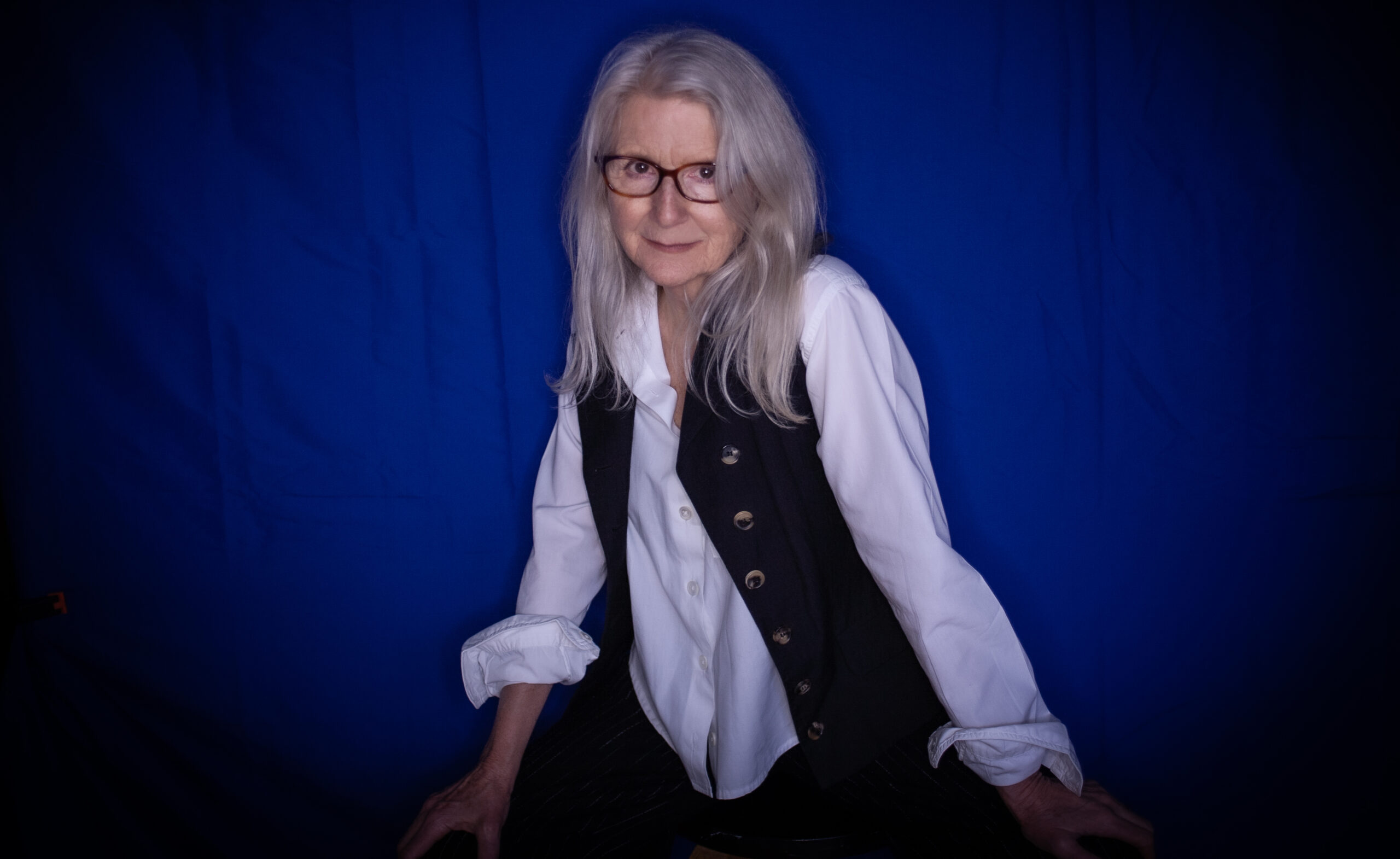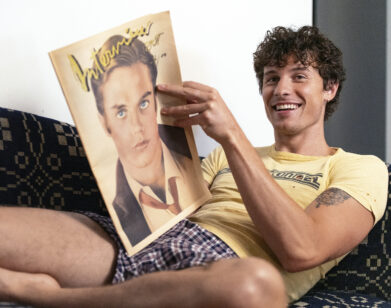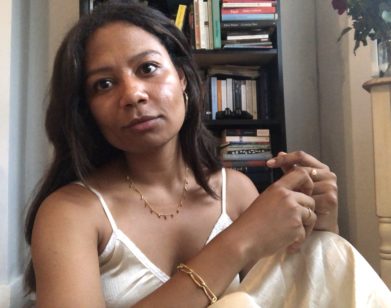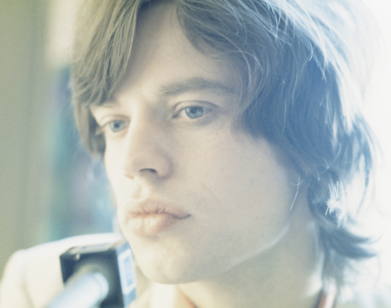IN CONVERSATION
Sally Potter on Doubt, da Vinci, and Her Debut Album Pink Bikini
Sally Potter’s first brush with Beethoven happened in her youth, when the acclaimed director would sit and watch her father listen, and sometimes cry, to 78s of the composer’s music. Potter would go on to have an illustrious career in film, directing Tilda Swinton in Orlando and Cate Blanchett in The Man Who Cried, but music—in the form of both film scores and her own recordings—provided a sort of throughline in her artistic life. Now, at the age of 73, Potter has released her debut album Pink Bikini, a semi-autobiographical collection of songs that hearken back to her experiences as a young woman in London in the 60s and 70s, with invocations of girlhood and geopolitical crises. “When you create, you give your heart, whether it’s Pink Bikini or Beethoven,” says the award-winning violinist Viktoria Mullova, a friend of Potter’s whose own 1995 recording of Beethoven’s Archduke Trio earned her a prestigious Diapason d’Or. Just after the release of Potter’s new album, the two got on Zoom to discuss the art of listening, the rigors of practice, and how to manage doubt in the artistic process.
———
SALLY POTTER: It’s always so lovely to talk with you, Vika.
VIKTORIA MULLOVA: Yes, likewise!
POTTER: And it also gives me an opportunity to praise you a bit. I don’t want to embarrass you, but you know how much I adore the way that you play. Your entire approach to music and your ear and your skill and the story of your life, it all adds up into a package, but a package of you. And in particular, the quality of your that on many occasions has moved me to tears. So it’s really nice to be able to have a talk. And what we were saying earlier is that apparently our histories are so different. You grew up in Russia, started to learn the violin at about four, and had this incredible classical education. And me, having virtually none, being self-taught. But somehow we end up all those years later working together on the soundtrack for The Roads Not Taken.
MULLOVA: Yeah, definitely. You are so multi-talented. It’s just amazing to see your films. You give so much in terms of music and the camera work and you write scripts full of poetry.
POTTER: It’s funny though, because I don’t think any of those things have anything to do with talent particularly, but more to do with curiosity and application and desire. It’s like, at the moment, my desire to write music is so strong—and it has been for the last four years now—that I wake up in the night looking at my watch and thinking, “Oh, it’s only half past three, it’s not time to get up yet and start.”
MULLOVA: I had a similar experience during the lockdown. “When do I start practicing again?” Which I normally hate. All my life I hated practicing except for when COVID came.
POTTER: And then suddenly you loved it. That’s interesting.
MULLOVA: Suddenly I found myself really eager to work and to explore and be creative with the violin.
POTTER: Right. But you needed space, the wasteland of space that COVID delivered to those of us that work in solitude, right?
MULLOVA: Absolutely. You can’t really work in the same way when you’re on tour. You take a plane, you have to pack and unpack. You just have to be in a certain frame of mind.
POTTER: And you have to deliver. You’ve spent a lifetime delivering on time, turning up, doing the gig at full intensity. And you are saying that you hated practicing, but actually you’ve always practiced a huge amount. I have an anecdote for you too. When I came to see a concert that you did on a boat on the Thames, you were playing arrangements of songs with the group. Now, in the interval, everyone else in the group got up and went to the bar to have a drink. You stayed there practicing one of the things for the second half, and I thought, “There’s Vika.” But even in that kind of informal concert situation, your primary allegiance was to refining what you were about to do.
MULLOVA: Absolutely, that’s familiar to me. Some people also like Sviatoslav Richter, piano legend of the 20th century, he used to practice after his concerts for hours through the night. I don’t do that.
POTTER: I can relate to that. When I see a film of mine at a premiere, and I’m sitting there with the audience seeing it for the first time, I’m thinking, “I could improve that. I wish I could do that. I’d love to remix that.”
MULLOVA: That’s the thing with our profession; you can always improve. When I listen to my old recordings, sometimes I like them, but most of the time I’m not completely satisfied. I can always do better and I can always change something.
POTTER: We were joking earlier about how, on the one hand, you are doing Beethoven, and on the other I’m doing Pink Bikini.
MULLOVA: It’s very funny.
POTTER: But in a way, the polarity is not so great. I’m not saying my Pink Bikini songs are like Beethoven, but I’m going to say that somewhere at the core of all of those endeavors, in the act of writing and trying to find something and push a boundary somehow, it’s all part of the same process, historically, and the lineage is complicated.
MULLOVA: And you’re influenced by so many things with your life and the art forms. And when you create, whatever it is, you give your heart, whether it’s Pink Bikini or Beethoven.
POTTER: Well, I think that the question of a state of connected intention and focus seems to be what transcends, for example, style. We’ve discussed other musicians playing—I won’t name names, but people who you found were overdramatizing a moment in music, both physically, but also in phrasing. The exact same thing applies in film or it can apply in very simple songs like the Pink Bikini songs, in which I tried to be intimate, pure, direct and raw. No style imposed on top, no vocal effects, nothing. It was a quality of restraint. And that’s something that I’ve admired very much in your playing. It’s like I can see through you to the intention of the imaginary sound of the composer because, as you rightly say, every musician is bringing a different reading, a different sense of what the writing is, of what the music is. And in your case, you are not imposing something on it. You are discovering its center.
MULLOVA: In Russia they used to say, “Don’t sweeten something with honey because it’s already sweet.”
POTTER: Honey is, of course, one of my favorite substances because of bumblebees, on whom we depend upon for everything. But that aside, I understand. It’s sentimentality, isn’t it?
MULLOVA: Yeah, sentimentality. And I always think about this with acting. When great actors don’t overact, I really love it. And there’s so many actors where I could see that they want to do more and more, and it’s better to do less sometimes.
POTTER: Something we talk about is, “Don’t speak the text, let the text speak to you.” And exactly the same thing applies with music, playing or singing.
MULLOVA: Absolutely. You do it with so much honesty. Honesty in music making is so important. You just write the songs from your heart and you don’t try to be someone else.
POTTER: Well, I don’t try to be someone else because I don’t know who I am in the first place. I think this whole notion of identity is very overrated. So I wanted to ask you about something in particular. Tell me how you relate to the act of listening, whether that’s to other people’s music, to new writing, to earlier writing, or to your own recordings.
MULLOVA: Listening is so important, starting with practicing. They say I’m a very good listener when I’m practicing because I hear every note, every nuance. And because I have the image in my mind of what I want to achieve, I try to match that. And sometimes, if something doesn’t really touch me, I start to get bored and I stop listening. So for me, I have to be already in that world and be interested and affected by what I hear.
POTTER: Interesting. I find that there’s listening, and then there’s deep listening, going into a kind of zone of deep focus in which everything becomes intensified. And as you say, the nuances become audible through the act of listening.
MULLOVA: And you keep discovering all your life, basically. That’s the most exciting thing. For example, Beethoven, I could go 10 years without playing it. Or with Brahms’ sonatas, I did the recording in ’98 or ’99 and I haven’t played them since. And I started to work on them because I’m playing in August, and I realized that there’s so many new things I can think of. And it’s so exciting to just find new ways, because one note you can play on four different strings, and the color of those notes could be different. You can play it in hundreds of different ways.
POTTER: So it blows apart the idea of the old and the new, doesn’t it? It’s like, everything in a way is now, to be found and explored now. Is there any meaningful dichotomy between classical music and, let’s say, jazz or rock or world music or Romanian gypsy music? For you, are they different kinds of music or are they just all music?
MULLOVA: [They’re] all music, and I love all of these genres. My library is so big. Sometimes I have incredible moments with jazz or electronic music. And there’s bad music too.
POTTER: I love the quote from Nadia Boulanger saying that, “Basically, you’re dealing with 12 notes,” at least in the Western canon. I hadn’t realized she would talk Quincy Jones as well as [Jean] Françaix and so many other great composers. But basically, you sit down to write music, you’ve got a choice of 12 notes, and how to rearrange them in different combinations.
MULLOVA: Not only notes, but space. And the timing is so important. It shapes the whole piece. So we are lucky that we have this creative process in our lives.
POTTER: Or not creative, as I tend to redefine it. I’m just wondering why I find it so necessary to argue with the term “creative.” And I think it’s partly because it tends to be a bit used in a kind of hierarchical way, or pejorative way, so some things are apparently creative, some things are not. It seems to me the spirit of exploration, discovery, curiosity, and longing that is the engine behind doing anything would apply equally, let’s say, to pure mathematics. In fact, I wish I knew more about pure mathematics. It feels very similar to music. To be able to understand the world in terms of numbers is, to me, similar to harmony, because harmony can be measured in numbers. People will say, “Well, the arts are creative and the sciences are not,” and it’s just not true.
MULLOVA: Yeah. For example, science and music go together. Leonardo da Vinci was also a scientist, and he was a creator of beautiful art.
POTTER: And Einstein played the violin. In general, scientists tend to be more knowledgeable about the arts than vice versa. But there won’t be very many artists and musicians who can talk knowledgeably about nuclear physics. One is a little bit more opaque than the other, or less accessible, anyway. Vika, what part does doubt play in your professional life, if any?
MULLOVA: Well, I don’t have much doubt. I don’t concentrate on the doubt. If I’m working on a piece which is really hard, of course I have doubts. “Oh, it’s not possible to play that,” contemporary music, for example.
POTTER: Right. That sounds more like a bit of fear.
MULLOVA: Yeah, it’s more fear. And then when you get through it, you realize it is possible. Then it’s easy.
POTTER: That’s because you started playing scales at the age of four.
MULLOVA: I know. Exactly.
POTTER: For me it;s utterly different because I don’t have that kind of basis. So it’s as if I’m in a state of beginner’s mind all the time. Instead, I’ve either broken all the rules, or invented my own rules, or found out how to do stuff. Years of working by ear on film scores changed for me, for example, when I learned how to use the app Logic. Suddenly all the music that I could hear in my inner ear, I could start to actually play. I could generate it via my keyboard skills, which are nominal, but they’re good enough for generating all the things I want to hear. But it’s such a different relationship with doubt, because the doubt is almost existential. Every new step is a leap into the dark. I sometimes say to students when I talk to them, “Okay, my solution with doubt when I’m working on a script is I try to write faster than the speed of my doubt.” That’s exactly what I’ve been doing with songwriting. I just come in here at six in the morning and I don’t leave the space for doubt. I just keep working.
MULLOVA: Sally, you’re so great at jumping into this unknown. And that’s very courageous.
POTTER: Well, it’s because I don’t have a career, Vika. Somebody asked me the other day about careers. I said, “Every move I’ve made in my life’s work is a kind of anti-career move.” I make something inappropriate at every age and in every way, but maybe it’s because I don’t want to repeat where I’ve been. I don’t want to have a brand, so to speak, because I’m not trying to sell something that is consistent. I’m trying to discover something which is inconsistent in order to taste this ineffable essence that lies behind the daily, quite plodding work.
MULLOVA: You work really hard, also.
POTTER: The hours are important. I remember hearing about the Beatles. The Beatles became The Beatles because they were in Hamburg playing the clubs, like three, four sets a day. They did their 10,000 hours in Hamburg. So their songwriting facility was so great because they’d just done so much of it. And I do have a lot of faith in just sheer application. As you tell me you loathed doing your hours of practice as a child, I kind of think, “Ooh, lucky Vika.”
MULLOVA: Yeah, I don’t regret my childhood. I even had to carry my violin to the Black Sea when we were traveling with the family to some resort. Oh, it was so awful, so painful.
POTTER: I feel no sympathy at all. I do, of course. But I also think that it’s gold dust.
MULLOVA: Yeah, I’m grateful. But I think you taught yourself really well, Sally. Because when I listen to your music, it’s so extraordinary, it’s very unusual, and I really relate to it. And you don’t need to play scales in order to create music like that. I wanted to ask you about this new recording you’re making now. Can you tell me more about that?
POTTER: No, because they’re under wraps.
MULLOVA: How many songs have you written already?
POTTER: About 20.
MULLOVA: Already 20?
POTTER: Yeah. But there won’t be that many. In the cutting room it’s good to have a lot of things you can throw away because what remains is then so densely packed with meaning. I’ll often struggle with a song for days or weeks, try this and try that, change the key, change the template, change the lyric, and in the end I realize it was never going to work. And some things happen very fast and come quickly.
MULLOVA: Do the words come together with the music, or you write music first or words first?
POTTER: At the moment, I write music first.
MULLOVA: Then the lyrics come later?
POTTER: Yes. But sometimes they come simultaneously. I was doing it on one song the other day, and suddenly these two words came with the rhythm of something I’d written musically, and the two words were, “walk away.” And that became the refrain: something something, walk away. With Pink Bikini, I couldn’t help each song being like a little story. And the whole thing is a kind of story through time of the turbulent and agonizing years of teenage-hood, especially when they correspond with the global agony of the Cuban Missile Crisis and the possible end of the world, the Cold War, all these mega splits and crises that echo in the soul, especially of the sensitive teen. But choosing the title Pink Bikini put an ironic face on it. That’s how people characterize teenage girls, a little bit superficial, a little bit pink. Whereas, in fact, underneath the pink bikini, there’s a raging torrent of thought and ideas and passions.
MULLOVA: Good title. I listened to this album of yours and I really loved it. It’s so original, so unlike anything I ever heard, just completely you.
POTTER: I’m just trying to be true. The only thing I had in mind when I was writing those songs was that they must be true.







